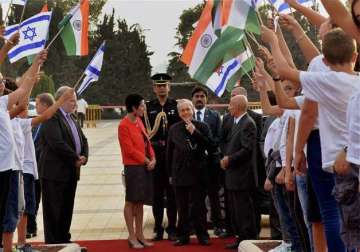India voices distress over Israel-Palestinian violence
Jerusalem: Voicing India's "distress" at the continuing violence in West Asia, President Pranab Mukherjee today called for a peaceful resolution of all disputes to which the Israeli Prime Minister Benjamin Netanyahu responded by affirming that

Jerusalem: Voicing India's "distress" at the continuing violence in West Asia, President Pranab Mukherjee today called for a peaceful resolution of all disputes to which the Israeli Prime Minister Benjamin Netanyahu responded by affirming that his country wanted to co-exist with Arabs but would firmly fight terrorism.
Mukherjee, the first Indian President to visit Israel, made a reference to the current violence in the region which has resulted in heavy Palestinian and Israeli casualties, during remarks he made at the Israeli Presidency where he was accorded a ceremonial reception by his Israeli counterpart, Reuven Rivlin.
He said, "we are distressed at the recent violence. India condemns all forms of terrorism. We have always advocated a peaceful resolution of all disputes".
Rivlin, in his response, said that India and Israel were "making history" by working together in a variety of fields and also in keeping "our peoples safe in the face of terrorism and fundamentalism".
Mukherjee, who has been criticised by the Israeli media for not mentioning Palestinian "terrorism" during his stay in Palestine prior to coming here, later told Knesset, the
Israeli parliament, that India believed that there is no better option than to resolve issues through negotiations and peaceful dialogue.
Speaking after the Indian leader at the Knesset, Netanyahu, in forthright remarks, underlined that both India and Israel were victims of terror which they have been fighting for years together as well as separately. He made a reference to the Mumbai terror attack in which a Chabad house was also attacked.
Netanyahu spoke of the strong challenges created by extremist Islamist groups, such as ISIS, and asserted "we should tell extremists it is enough". Israel wanted peace but would stand upto terror which had to be defeated.
Read Also: India condemns all forms of terrorism: President Mukherjee
Mukherjee, the first Indian President to visit Israel, addressed Knesset during an hour-long session attended by his Israeli counterpart, Reuven Rivlin, Netanyahu and members from various parties.
He was given a standing ovation by the House. On the penultimate day of Mukherjee's 3-day state visit here the two countries signed a double taxation avoidance agreement as well as a cultural exchange agreement.
Mukherjee, accorded the rare honour of addressing Knesset, told the house that relations between the two countries were on a very "positive trajectory".
It has been India's consistent policy to build a strong, substantive and mutually-beneficial relationship with Israel.
"As we approach the 25th anniversary of the establishment of full diplomatic relations, we both seek to expand the vision of our future partnership", he said.
The President made a specific reference to the help provided by the Israeli government by rushing critical defence supplies to India during the Kargil war in 1999.
He mentioned the government's ambitious "Make in India" campaign and said that Israeli innovation and technology can combine with Indian engineering and scale to manufacture in India.
"Such a partnership, particularly in the defence sector, has the potential of creating new markets and generating more jobs, both in India and Israel", Mukherjee told the parliament.
He mentioned the fact that both India and Israel were democratic countries and made a reference to the 2014 Lok Sabha elections whose outcome was historic because the Indian electorate had voted for a majority government for the first time in 30 years.
"I am happy to say that as President of India voted to office at the time of the previous government, I had the satisfaction of presiding over a very smooth transition from one democratically elected government to another", he said.
Mukherjee also thanked Israel for its support to India's claim to a permanent membership of the UN Security Council.
The organisations of the UN needed to be more responsive to the challenges that the world faces and its structure needed reform reflecting the changed world, he said.
The President referred to some of the new initiatives in economic policies taken by the Indian government which was also emphasising innovation, research and technological development to accelerate India's social and economic transformation.
"India and Israel can work together in each of these areas", he said while seeking Israeli assistance in dealing with the challenges of uneven distribution of water faced by Indian farmers as also in cleaning rivers, particularly the holy Ganga.